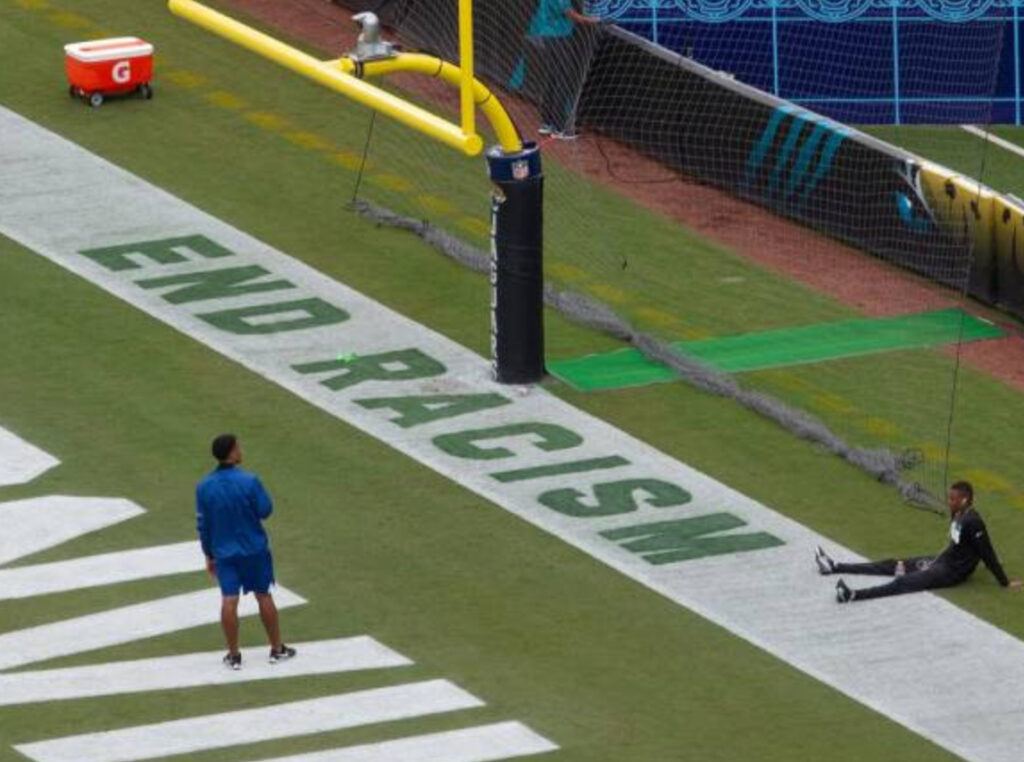A Changing Narrative in the NFL
The NFL has long been a cultural and social bellwether in the United States, reflecting and responding to broader societal movements. This year, the league is making a notable change to its on-field messaging during Super Bowl LVIII, replacing the slogan “End Racism” with “Choose Love.” The decision comes as part of the league’s ongoing efforts to engage with social issues while adapting to the national climate.
While this shift may appear subtle, it carries significant implications. The NFL has positioned itself at the intersection of sports, politics, and social justice, particularly since 2020 when it embraced more overt advocacy through initiatives like “Inspire Change.” The decision to remove “End Racism” from the field in favor of “Choose Love” signals a recalibration of the league’s messaging—one that prioritizes unity and a broad appeal over direct calls for systemic change.
Why the Change?
According to NFL spokesperson Brian McCarthy, the decision to switch the field slogan was influenced by recent national tragedies. Among the cited events were the New Year’s terrorist attack in New Orleans—where this year’s Super Bowl is set to take place—the devastating wildfires in Los Angeles, and the tragic midair plane collision in Washington, D.C. These incidents have reignited discussions about national unity, safety, and collective resilience, all of which may have contributed to the NFL’s decision to adopt a less politically charged message.
The league’s pivot from “End Racism” to “Choose Love” can also be viewed as a response to shifting public attitudes toward corporate activism. While social justice advocacy was at the forefront of many corporate and institutional agendas in 2020, the landscape has changed considerably. Recent backlash against diversity, equity, and inclusion (DEI) initiatives—along with corporate pullbacks in response to economic and political pressures—may have influenced the NFL’s decision to adjust its messaging.
The NFL’s DEI Commitment Amid Corporate Retreats
Despite this shift in on-field messaging, NFL Commissioner Roger Goodell has reaffirmed the league’s commitment to DEI initiatives. In his annual Super Bowl press conference, Goodell expressed continued support for programs like the Rooney Rule, which mandates that NFL teams interview minority candidates for head coaching and executive positions.
This stance stands in contrast to other major American institutions that have recently retreated from DEI commitments. Companies such as McDonald’s, Target, and Walmart have scaled back or eliminated DEI programs, aligning with a broader national pushback against corporate social responsibility efforts. Former President Donald Trump’s executive orders banning DEI training in the federal government, coupled with state-level legislation restricting such programs, have contributed to this shift.
The NFL, however, remains one of the few high-profile organizations continuing to advocate for DEI principles. This commitment is particularly significant in a league where over 70% of the players are Black, yet the vast majority of ownership and executive leadership remains white. Despite ongoing criticism regarding the effectiveness of the Rooney Rule, the league has continued to emphasize the importance of equitable hiring practices.
The Broader Cultural and Political Context
The NFL’s messaging change must also be understood within the broader cultural and political climate of the United States. In recent years, discussions about race, equity, and justice have become increasingly polarized. Following the nationwide protests in 2020 after the murder of George Floyd, many corporations and institutions embraced social justice initiatives. However, the backlash against perceived “woke” corporate policies has intensified, leading many companies to quietly walk back their commitments.
In this context, “Choose Love” may be seen as a safer, more universally palatable message compared to “End Racism.” While “End Racism” directly addresses systemic issues, “Choose Love” is a broader, less controversial call for unity and compassion. This shift aligns with a growing trend among corporations and public institutions to avoid overtly political statements while still signaling a commitment to social responsibility.
The Evolution of the NFL’s Social Justice Messaging
The NFL’s relationship with social justice advocacy has been complex and, at times, contradictory. The league faced intense scrutiny for its handling of Colin Kaepernick’s protest against police brutality in 2016, which led to his effective blackballing from the league. At the time, the NFL largely avoided addressing racial justice issues, fearing backlash from its fan base and corporate sponsors.
However, in the wake of the 2020 protests, the league took a dramatically different approach. Goodell publicly acknowledged the NFL’s past failures regarding racial justice and expressed support for players speaking out on social issues. The “Inspire Change” program was expanded, and slogans like “End Racism” and “It Takes All of Us” were prominently displayed on the field and players’ helmets.
The decision to now replace “End Racism” with “Choose Love” suggests a strategic recalibration rather than a complete departure from social justice advocacy. The NFL remains committed to DEI initiatives, but its messaging has shifted toward a more broadly accepted theme that avoids direct engagement with politically contentious issues.
The Impact on the Event Planning Market
The shift in the NFL’s messaging raises questions about whether this is an isolated change or part of a larger trend. If the league—one of the most influential institutions in American sports—is opting for a more neutral approach to social issues, other organizations may follow suit.
For brands and corporations that sponsor the NFL, this change may offer insight into how they navigate social responsibility moving forward. Companies that previously championed racial justice initiatives may choose to adopt a more neutral stance, focusing on themes of unity and love rather than direct calls for systemic change.
At the same time, advocacy groups and activists may see this as a step backward. The removal of “End Racism” from the Super Bowl field could be interpreted as the NFL distancing itself from the more urgent demands of the racial justice movement. While “Choose Love” is a positive message, it does not directly acknowledge the systemic issues that “End Racism” sought to highlight.
Looking Ahead: Will the NFL’s Strategy Pay Off?
The long-term impact of the NFL’s messaging shift remains to be seen. The league has successfully navigated numerous controversies in the past and remains the most dominant force in American sports. However, its approach to social justice messaging will continue to be scrutinized, particularly as political and cultural attitudes continue to evolve.
Will this change satisfy both advocates for racial justice and those who oppose corporate activism? Or will it alienate both sides by appearing too cautious? The answer may depend on how the NFL continues to engage with social issues beyond the Super Bowl.
For now, “Choose Love” represents a carefully curated message—one that seeks to unify rather than divide. Whether it will be effective in maintaining the NFL’s relevance in broader social discussions remains an open question. As the league prepares for Super Bowl LVIII, all eyes will be on how this shift is received by players, fans, and the larger public.
No comments yet.








